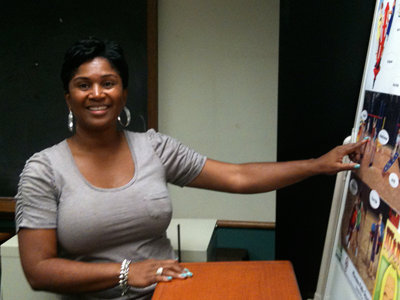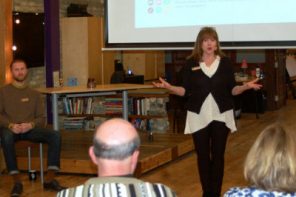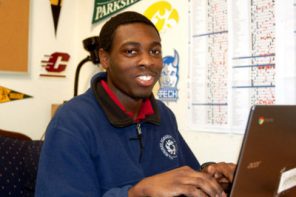In July I met the whirlwind of excitement and energy that is Nancy Martinez, who recently took over as principal at MPS’ Kagel pre-K through fifth grade school in Walker’s Point.
In August, I visited her friend and colleague Tamara Hines, who hopes to provide some stability at Gaenslen School, a pre-K through eighth grade school in Riverwest, where she started as principal on July 1.
Gaenslen, which is a school unlike most any other in the city, has had a couple principals in recent years, says Hines, who hopes she can keep the ship on course.
Ninety percent of kids at Gaenslen, which had an enrollment of 673 students last year, qualify for free and reduced lunch. That’s code for nine out of every 10 kids in the school lives in poverty. But, sadly, that’s not rare in the district.
But at Gaenslen nearly one out of every two students is classified as special education and the school has a large population of students with disabilities. That explains the ramp into the warm-water physical therapy pool that the Milwaukee Recreation Dept. uses on evenings and weekends for public swim classes.
Visiting in summer I expected Gaenslen to look a lot like Kagel, which was empty except for Martinez, her building engineer and her secretary who was working on a volunteer basis in the summer.
But no, school is almost never out at Gaenslen. Just when the traditional school year ends in June, the Extended School Year program kicks in and so do summer school and a Milwaukee Rec Dept. summer Community Learning Center program, too.
When I stopped in … Let me clarify. The first time I stopped in, Hines was being pulled in three directions at once and I told her I’d happily return and we made a new appointment. When I visited the second time, she dealt with a few issues and managed to find a few minutes to show me around.
While other principals might be enjoying their summer with their families, Hines has been working all day every day since her July 1 start.
“This school is kind of like a lighthouse school,” says Hines. “There are so many activities going on outside of Gaenslen (program itself). A lot of Milwaukee Rec programs and stuff. This is a community building.”
Gaenslen also has a public Alice Bertschy Kadish Weaving Center that attracts a large group of community weavers, fiber artists and basket makers into the building on a regular basis.
And, unlike most schools, Gaenslen has things like a vision center, elevators for handicapped students and classrooms for cognitively disabled students, too.
So, it might come as a surprise that Hines not only did not come from the Gaenslen community but has no background in special education.
“The first time it was posted I did not apply,” Hines recalls, “because they were talking that it was a special ed. school so I thought they were looking for a certain kind of person. When it got re-posted I talked to my friend who is a principal and he said to research the school to find out more about it. Once I found out more about it, they don’t consider themselves a special ed. school. This is just a regular school.
“They were looking for a person who can teach all kids. So when I did some research and found out the type of person they were looking for I thought, ‘that’s me.’ I love kids; it doesn’t matter if they’re special ed. kids or regular ed. kids, they’re just kids.
“That’s the philosophy here, that all kids are created equal and with respect. This is a real world here. We have some people who are in wheelchairs and that’s what happens when they go outside the walls and the doors and they see that in real life. So I am excited to be here.”
Hines has varied experience in education. She was principal at the Parklawn Assemblies of God K-5 school and was also a principal at a voucher school, a job she says she decided was not the job for her. She then landed at UW-Milwaukee, but later applied to the national non-profit New Leaders for New Schools principal training program, which had been established in Milwaukee in 2007.
After two years at Bay View, Hines decided to apply for some of the numerous principalships that opened in the district in spring. She made the finals for two schools.
“I met with the superintendent for both schools,” she says. And when superintendent Gregory Thornton asked her if she had a preference, she said she did.
“I said Gaenslen, and he said ‘why?’ So the whole conversation became about Gaenslen but my regional specialist who is my immediate boss said ‘why Gaenslen?’
“I said, well, I got summer school – I was here for ESY (Extended School Year) – and I said I feel that everything is just lining up. I would love both schools equally. I love kids, I will serve wherever you put me, and I will lead wherever you put me. And she said ‘OK.’ So when I left I thought, ‘OK I’m going to go to MLK and Green Bay,’ but at the last hour they put me here.”
Now that she’s at Gaenslen, Hines feels like she has a lot of work to do in the here and now and so, unlike her friend at Kagel, she’s not thinking too much about five years out, 10 years out.
“I went for the first-year vision,” she says, “because I knew that in the last few years they had two principals. So, my first thing is to give them stability. ‘I will commit to being here with you.’ The second thing is they are dealing with loss. The principal’s gone and some of them really loved their principal. So I want to keep their moral high and get some quick wins with them. So I am always there, whenever they turn around I’m there I’m there I’m there.”
Also important for Hines is to keep the momentum going on improvement. The school made Adequate Yearly Progress last year thanks to improved scores on the state WKCE tests but there is still a ways to go. Hines knows the improvement has come thanks to a dedicated staff and families.
“Let me give you an example. One kid who was special ed. was so sick but we knew he could take the WKCE and (the school community) cheered (because) it’s a powerful story,” she says. “The teacher went home to his house and supported him and helped him so that he could take that WKCE test.
“So we are not looking for ways to say that they can’t do it, we are looking for ways to say that they can do it. I want to make sure we treat parents with respect, students with respect. I treat teachers with respect.”
To help keep the entire Gaenslen community on the track to success, Hines is going to make a banner that says “Congratulations, you met AYP. All staff, students, and parents you should be honored.”
“I am going to make a BIG banner because they met AYP and it doesn’t say that anywhere in the building. Well it’s going to be on a big banner.”
She also plans on putting up a high-profile WKCE bulletin board to post the school’s scores and other academic achievements. It’s important, she says, to publicly promote successes.
“I am going to try to find ways throughout the building to promote student achievements,” says Hines. “So it can’t just be that student achievement is important, we’ve got to have it in the forefront. We got to be looking at it; we have to know the data.”
One of the folks that will see the banner and the board is previous principal Ada Rivera. Though she has retired and is no longer at the helm at Gaenslen, Hines says Rivera remains committed to the school. The two are working together to continue to build on some of Rivera’s successes.
“She loves this school,” says Hines. “We will be meeting to talk about some of the initiatives that she started and for me to keep going with those initiatives. Like the (wheelchair accessible) playground, that’s her initiative, but she passed it along to me to make sure that happens. So those are some of the things that we are doing.
Although Gaenslen has lost funding, as all schools have, Hines says she thinks that her program is relatively OK, having lost a gym teacher and four days of a previously full-time librarian. She’s hoping that via a full enrollment she can get enough money back into the building to replace those positions.
So, I ask, what is Hines’ biggest challenge as she preps for the Sept. 1 start of the 2011-12 school year?
“Increasing the rigor so that we can get higher test scores,” she says. “My job is not to say that we can get comfortable, we’ve got to keep moving. So I have to find a way to be strategic. We are here, but we really need to get there. I have to find the strategies to get them there.”


 i evaluate to yes even if there's no image
i evaluate to yes even if there's no image  i evaluate to yes even if there's no image
i evaluate to yes even if there's no image  i evaluate to yes even if there's no image
i evaluate to yes even if there's no image  i evaluate to yes even if there's no image
i evaluate to yes even if there's no image  i evaluate to yes even if there's no image
i evaluate to yes even if there's no image  i evaluate to yes even if there's no image
i evaluate to yes even if there's no image 